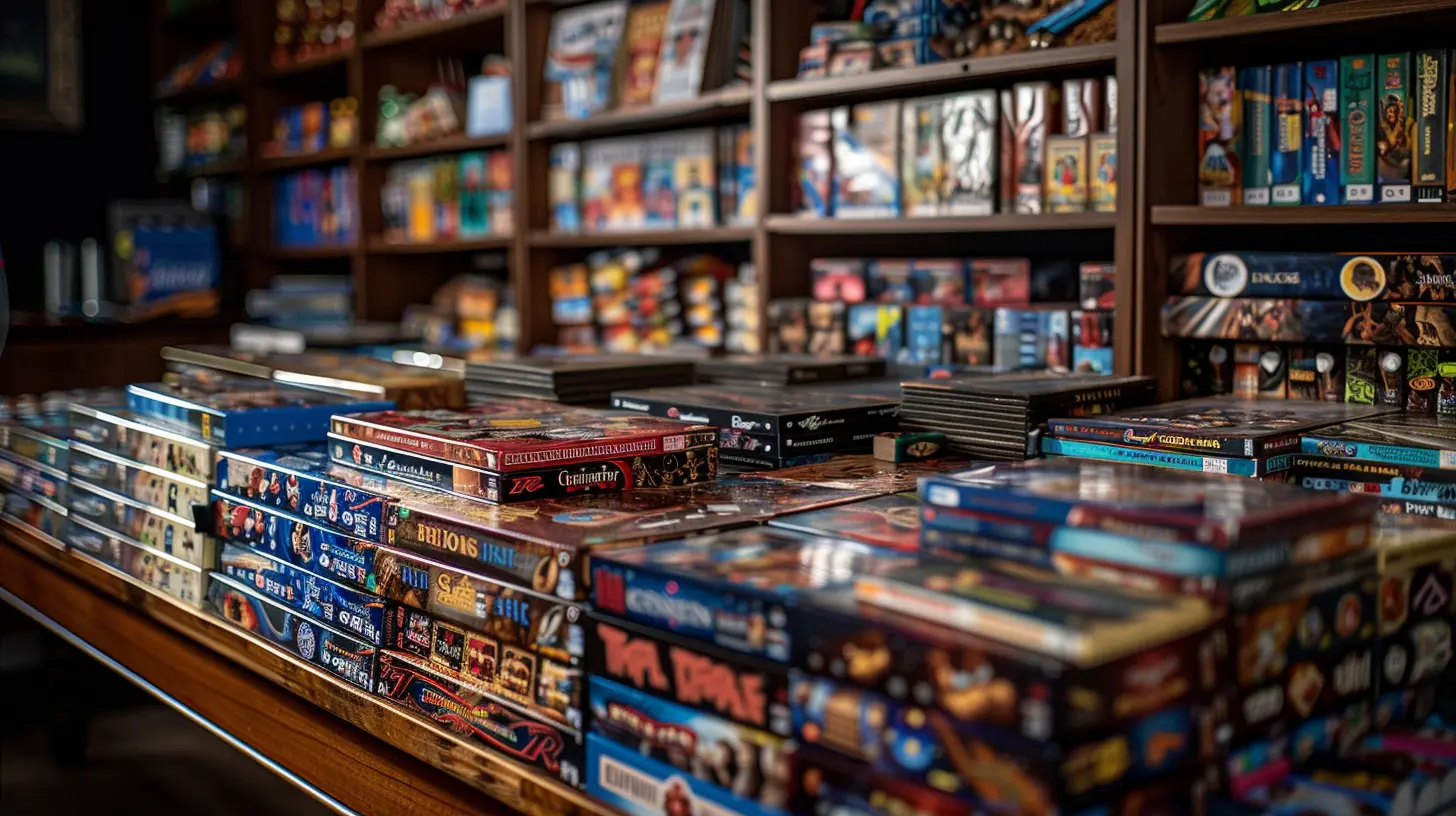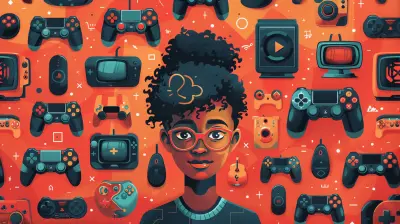The Benefits of Board Games for Children’s Development
23 November 2025
Let’s admit it—nothing beats the joy of sitting down with family or friends, pulling out a board game, and diving into hours of fun. At first glance, board games might seem like nothing more than entertainment, just a way to kill some time on a rainy afternoon. But here’s the kicker: board games are secretly little brain-boosting ninjas that can do wonders for children’s development.
Yup, you read that right. These colorful, cardboard creations are more than just games; they’re tools that help kids grow! From sharpening problem-solving skills to building emotional intelligence, board games offer a treasure chest of benefits for young minds. Let’s roll the dice and unpack why every parent should make board games a regular part of their child’s life.
1. Boosts Critical Thinking and Problem-Solving Skills
Ever watched a child strategize during a game of chess or figure out their next move in Monopoly? It’s like watching their brain go into overdrive! Board games are fantastic for encouraging kids to think critically and solve problems.These games often require players to assess the situation, plan ahead, and make decisions under pressure. Take Scrabble, for example. A child has to analyze their available letters and strategically place high-scoring words on the board. That tiny challenge? It’s their brain lifting weights at the cognitive gym.
Problem-solving is a life skill, and board games provide a safe space for kids to practice it. The beauty here is, even when they lose, they learn resilience and how to adapt their strategies for next time. It's like failure, but with training wheels.
2. Enhances Social and Communication Skills
Let’s face it—kids these days spend way too much time staring at screens. Board games offer an antidote to the isolation of the digital world. They create spaces where kids have to interact, share, take turns, and engage with others face-to-face.Think about a round of Guess Who? or Clue. Children have to communicate effectively, ask the right questions, and listen carefully to clues from other players. These skills translate directly into real-world situations, where strong communication is key.
Board games also teach kids about cooperation and teamwork. Games like Pandemic or Codenames require players to work together to achieve a common goal. It’s a win-win: kids have fun and learn how to collaborate with others.
3. Improves Patience and Focus
Let’s be honest—kids aren’t exactly known for their patience. But here’s the thing: board games can help change that. Most games require players to wait for their turn, follow rules, and stick with the activity until it’s finished.Playing a board game is an exercise in delayed gratification. It teaches kids that good things (like winning or achieving a goal) come to those who wait and stay focused. Games such as Jenga or Operation demand steady hands and attention to detail, helping children strengthen their focus and concentration.
And let’s not overlook how board games encourage mindfulness. Unlike video games, which can be overstimulating, board games slow things down. They ground kids in the present moment, giving them a break from the fast-paced world.
4. Promotes Emotional Development
Let’s talk feelings. Board games are mini emotional roller coasters—they can make you feel triumphant one moment and frustrated the next. For kids, this emotional ebb and flow is an excellent learning opportunity.When children lose a game, it teaches them how to deal with disappointment and bounce back. When they win, it builds their confidence and gives them a well-deserved sense of accomplishment. Even during gameplay, kids learn to manage emotions like frustration, excitement, and anticipation.
Games also encourage empathy. For example, in cooperative games like Forbidden Island, players need to think about how their actions impact the team. This helps kids consider others’ perspectives—an essential skill for emotional intelligence.
5. Encourages Healthy Competition
Let’s be real—competition isn’t inherently bad. It’s all about how you handle it, right? Board games introduce kids to healthy competition in a controlled environment.They teach kids to compete respectfully, follow rules, and play fair. There’s a balance to this: kids learn it’s okay to strive for success but also that losing isn’t the end of the world. These lessons prepare them for competitive situations in school, sports, and beyond.
Plus, competing in board games is way more fun than, say, competing over who can finish their vegetables first. (We’ve all been there as parents.)
6. Develops Math and Literacy Skills
Who said learning can’t be fun? Many board games sneak in educational elements without kids even realizing it. Games like Uno and Monopoly help kids practice counting, addition, and subtraction as they keep track of cards, property values, and game money.Games like Boggle or Scrabble? They’re perfect for expanding vocabulary and improving spelling. Even balancing resources in games like Catan introduces kids to basic economic principles. It’s like hiding vegetables in mac and cheese—your kids are learning without even knowing it.
7. Fosters Creativity and Imagination
Board games aren’t just about numbers and strategy—they can also unlock a child’s inner dreamer. Games like Dixit or Pictionary let kids think outside the box and tap into their creativity.Even classic games like Candy Land or The Game of Life allow children to immerse themselves in a storyline, sparking their imagination and making them feel like part of an exciting adventure. Board games encourage kids to see the world not just as it is, but as it could be.
8. Strengthens Family Bonds
If there’s one thing board games do better than anything else, it’s bringing people together. In a world where families are often pulled in a hundred different directions, sitting down for a board game night can work wonders.For parents, it’s an opportunity to connect with kids in a relaxed, fun setting. For siblings, it’s a chance to bond (and maybe argue a little, but hey, that’s part of the deal). The shared laughter, competition, and teamwork create lasting memories that kids will carry with them for years to come.
9. Reduces Screen Time
Let’s not sugarcoat it—kids today are glued to screens. From tablets to video games, it’s easy for children to get lost in the digital world. Board games are an engaging alternative that doesn’t involve staring at pixels.By swapping out screen time for game time, kids get a break from blue light exposure and overstimulation. Plus, they’ll be engaging in an activity that’s both entertaining and enriching. It’s a parenting win.
10. Reinforces Rule Following and Structure
Rules might not sound like the most exciting part of a board game, but they play a big role in a child’s development. Learning to follow rules helps kids understand structure, boundaries, and consequences.When kids play games like Risk or Ticket to Ride, they learn the value of playing by the rules. And let’s face it—rules are everywhere in life, from the classroom to the playground and beyond. The sooner kids learn to respect them, the better.
Conclusion: A Game-Changer for Development
Board games are more than just a way to pass the time—they’re a powerful tool for helping kids grow. From boosting critical thinking and fostering creativity to improving social skills and strengthening family bonds, the benefits are undeniable.So, the next time you’re looking for a fun, engaging activity for your child, why not break out a board game? You’re not just giving them a fun experience; you’re giving them a head start in life. Plus, let’s be honest, who doesn’t love a good game night?
all images in this post were generated using AI tools
Category:
Board GamesAuthor:

Emery Larsen
Discussion
rate this article
1 comments
Jackson McQuade
Who knew rolling dice could be a brain booster? Board games not only level up kids’ problem-solving skills but also serve up endless laughter. It’s like a fun workout for their minds—no gym membership required!
November 23, 2025 at 5:59 AM

Emery Larsen
Absolutely! Board games are a fantastic way to enhance kids' cognitive skills while keeping the fun alive. They truly are a workout for the mind!


